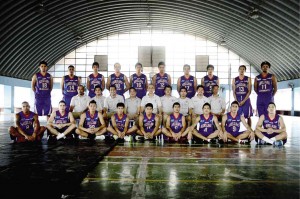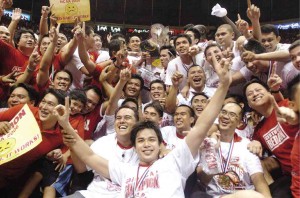What it takes to coach a college team

CHIEFS all, the 2013 AU team with the coaching staff seated in the middle row; that’s the author in the center. INQUIRER PHOTOS
“Success is…knowing your purpose in life, growing to reach your maximum potential and sowing seeds that benefit others.” John C. Maxwell said that and I think he spoke on target.
At 13, my dream was to be a good basketball player and make it to the pro league. It did not happen and I know now why. If I had more self-discipline, I could have made it. If I had allotted time for extra practice, I could have made it. If I had avoided the wrong choices as a teenager, I could have made it. Name any crazy thing that a teenager would do and I had done it. So many “ifs” and “could haves.”
But God’s plans for me do include basketball. One has led me to the PBA but not as a player. Another involves college basketball.
Nowadays, it is cool to tell the young to find their passion. I could not agree more. I found mine back when I was playing for San Beda College (SBC). As I listened to coach Bonnie Carbonell explain the mechanics and objectives of a particular drill, I would think to myself that this was what I wanted to do someday. I was not sure when, but I knew it was going to happen.
My break in coaching came when my brother, Joel, invited me to join the coaching staff at Mapua Institute of Technology where, as head coach, he engineered the Cardinals’ back-to-back NCAA championships in 1991-1992. I became a volunteer assistant coach at Mapua for five years. Not the assistant coach but just one of the assistants. Not a paid employee but a volunteer. Not just for a year but for five years.
Challenge
One day at a practice, I tried to point out something to a player. Instead of listening to me, he turned and walked away, as if to say I had no idea what I was talking about. From that day on, I asked Joel for assignments and started reading up on basketball, as well as leadership. If I wanted our players to work harder to improve their skills, I thought, I myself should work harder and improve my own. Walk the talk, as they say.
I believe God allows things to happen for a purpose. If not for that player, my growth as a coach would have been slower. His attitude challenged me to acquire better coaching skills.
In addition to reading up on basketball, like a hawk I watched Joel and other coaches do their work. I attended clinics as often as possible. I’ve been to various universities in the United States to observe, at practice and at actual games, their coaches—Fran Fraschilla at St. John’s University in New York, Tommy Amaker at the University of Michigan and Tom Izzo at Michigan State University in Michigan, Lorenzo Romar at the University of Washington in Seattle, Shaka Smart at Virginia Commonwealth University and Johnny Dawkins at Stanford University. I’ve also picked up a lot from Tom McMillan of the Seattle Supersonics (now OKC Thunders). I have attended the Nike Coaching Clinics in Chicago and Las Vegas. And I continue my education by watching our San Mig Coffee Mixers head coach Tim Cone and listening to him at practice and during games.
Motivation
As a coach, you owe it to yourself and your team to keep growing and learning so you can go on sharing the knowledge. A coach is first a teacher. Every day you are giving your players lessons. They think it is mostly about basketball but the smarter ones end up using a lot of it in life. (Your other roles are to be an older brother, a father, a spiritual adviser or whatever a player needs you to be in his moment of need.)
Discipline is the foundation of a basketball team. To me, the way to instill discipline is to be firm on team rules. Discipline develops character, which determines attitude. Basketball depends a lot on the attitude of the players. More than the skills, I believe what helps players in games and in life is a never-say-die attitude that pushes them to face all kinds of challenge.
While everyday practice is most helpful to athletes, I think motivating them to give their best is just as important. I normally show a video to my team that inspires and gives emphasis on character. I want them to learn to value values, not just passing, rebounding and shooting skills. The right values will give them direction in life.
If I can show players only one video, it would be “Men of Honor,” the Cuba Gooding Jr.-Robert de Niro movie about an amputee’s perseverance to become a diver against all odds and his
tough trainer.
Building a program
I’m blessed to have led three different teams to championships after so many years of a title drought for their schools. But although titles and trophies can make you feel great, what I love is the challenge of building a college basketball program and taking it all the way to the championship. It does not matter if it is a big university or a not-so-well-known one.
As a coach, you have to convince the community why they need a good basketball program and present one. You have to extend the program to the grade school and high school players because they are your farm teams. You have to make the alumni believe that your team is worth their support. You have to recruit young men who you believe will eventually become not just outstanding players but great people. You have to teach solid basketball to all your players because it is the foundation of every successful program.
In my first year as head coach of the FEU Tamaraws, we were outcheered at the UAAP playoffs. Most of the time, FEU students occupied only a third of the seats at the arena when we were playing.
After such limited support from the community, which was really bad for our team’s morale, I asked the team to go on a room-to-room campaign to encourage more students to attend the games. As a coach, I saw it as my duty to bring the team closer to the students so our players would not be perceived as snobs or, worse, dumb jocks. I wanted the students to take ownership of the team.
We’re planning to do the same at Arellano University (AU) this coming season. The difference is that we now have to promote our program on six campuses.
Support for the team should start with the school leadership. The presence of the president, athletic director, dean, principal and alumni at the games means a lot to the players. I’m grateful that we’re getting that kind of support from AU chair and CEO Francisco V. Cayco and the rest of his family.
Some coaches find the need to seek corporate sponsorships for their teams, especially if they want to continue training the players off-season by entering the team in amateur leagues. I did not have to do that for SBC, although I did attend alumni gatherings here and there. For the Tamaraws, I wrote FEU alumnus Ramon S. Ang a request for sponsorship of the team in the PBL. Now at AU, we are being supported by San Mig Coffee, Gerry’s Grill, Erase Placenta, Hawks Bags and Autostar Suspension Parts.
Recruitment
Recruiting good players is a problem for an average university. To widen my network, I have asked our scouts to look in the provinces for players who have potential. There are promising guys out there who have dropped out of school because of poverty and are not aware of athletic scholarships that can give them the opportunity to earn college degrees and get decent jobs someday.
One of the things I like about basketball is that it is an equalizer. It doesn’t matter if you’re the son of a rich man or a poor man. On the court, in the thick of the game, all you can depend on are your skills and your teamwork.
As a coach, the most important aspect I look at when I’m scouting a player is attitude. I give big points for a player’s respectful attitude toward his coach, teammates, opponents and community.
It is somewhat sad to see highly recruited players waiting around for a team that would give them more benefits. They do not even consider the track record of the head coach. When Michael Jordan was in high school, his dream was to play for Dean Smith, the legendary coach of the University of North Carolina, because he believed Smith would get him prepared for the NBA.
When we are recruiting for AU, I make sure to meet with a prospective player’s parents. I tell them that our university does not have money like the top schools, but we have coaches who can help their son fulfill his dreams of becoming the best that he can be and an academic program that can give him employable skills. Good thing for me that the AU administration and coaching staff are working hand in hand to give our athletes the best possible atmosphere at school.
I also always tell the parents that I will treat their son like my own and will personally look after his welfare. This is a promise that I have always taken to heart.
Turned pro
Even though they’re playing against my team, it feels good to see my former college recruits now playing in the PBA. Arwind Santos, Denok Miranda, Mark Isip, Jeff Chan and Jonas Villanueva are all from my FEU team. Ogie Menor, Yousef Aljamal and Bambam Gamalinda are all former Red Lions. There is no more satisfying thing than to see these guys driving
brand new cars, living in beautiful homes and sending their children to good schools.
But I’m just as proud of my players who did not make it to the pros and yet are doing very well in their chosen line of work. They have proven that there is life after basketball.
I would like to believe that what they have learned as basketball players has helped them in some way to make a better life for themselves and their loved ones outside the sport. When I think about them, I pause and thank God for giving me the opportunity to be a part of their world and for making a difference, no matter how small, in their lives. I am hoping our AU players will meet with the same success someday.
I believe coaching has more to do with leadership than teaching a particular sport. You cannot just tell your players what to do—you have to show them the right way, do everything to the best of your ability and try to inspire them to do the same.
(The writer is head of the basketball program at Arellano University and head coach of the AU Chiefs. Concurrently, he is an assistant coach for the San Mig Coffee Mixers in the PBA. Except for a break of four years, he has been involved in college basketball coaching for 21 years. He led the PSBA team to the NCRAA title in 1998, gave the FEU Tamaraws back-to-back UAAP trophies in 2003-2004 and won the NCAA championship with the SBC Red Lions in 2006. Also, as a disclaimer, he is the editor’s youngest brother.)
















